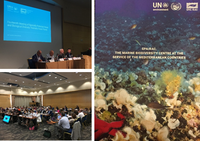Fourteenth Meeting of SPA/BD Thematic Focal Points – Jun 18, 2019
"A healthy Mediterranean with marine and coastal ecosystems that are productive and biologically diverse contributing to sustainable development for the benefit of present and future generations", the vision of the Mid Term Strategy (MTS) 2016-2021 of the Mediterranean Action Plan of the United Nations Environment Programme (UNEP/MAP) progress was at the heart of the Fourteenth Meeting of Specially Protected Areas/Biodiversity (SPA/BD) Thematic Focal Points.
REMPEC attended together with over fifty (50) experts in the field of the conservation of biodiversity and ecosystems from 20 Contracting Parties to the Barcelona Convention, as well as representatives from UNEP/MAP and its Components, other governmental and non-governmental organizations, and industry and associations, the Meeting organised by the Regional Activity Centre for Specially Protected Areas (RAC/SPA) in Portorož, Slovenia, from 18 to 21 June 2019.
In the context of this first thematic meeting addressing one (1) of the seven (7) MTS Strategic Themes, REMPEC contributed by presenting its activities carried out to implement the Biodiversity and Ecosystems core theme since the Thirteenth meeting of SPA/BD Focal Points in 2017, in particular:
- by providing guidance to Contracting Parties on the identification of Particularly Sensitive Sea Areas (PSSAs) in relation with Specially Protected Areas of Mediterranean Importance (SPAMIs), in tandem with the relevant activities coordinated by RAC/SPA
- by supporting the ratification and effective implementation of:
International Convention on the Control of Harmful Anti-fouling Systems on Ships (AFS Convention), which prohibits the use of harmful organotins in anti-fouling paints used on ships and establishes a mechanism to prevent the potential future use of other harmful substances in anti-fouling systems;
International Convention for the Control and Management of Ships’ Ballast Water and Sediments (the Ballast Water Management Convention) which address the introduction of harmful aquatic organisms and pathogens to new environments, that had been identified as one of the four greatest threats to the world’s oceans (the other three being land-sourced marine pollution, overexploitation of living marine resources and destruction of habitat)
REMPEC also contributed to the discussions on the Conservation of Species and Habitats and Conservation of sites of particular ecological interest, by presenting Mediterranean Offshore Guidelines and Standards prepared by REMPEC namely, the Draft Guidelines for the Conduct of Environmental Impact Assessment (EIA) and the Draft Common Standards and Guidelines for Special Restrictions or Conditions for Specially Protected Areas (SPAs) within the framework of the Mediterranean Offshore Action Plan.


